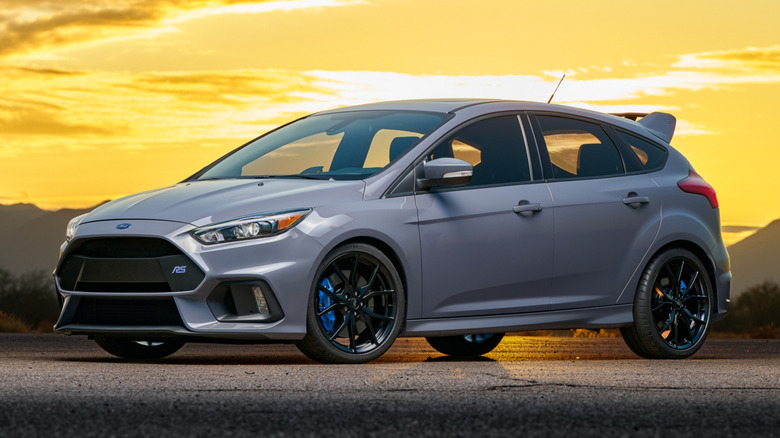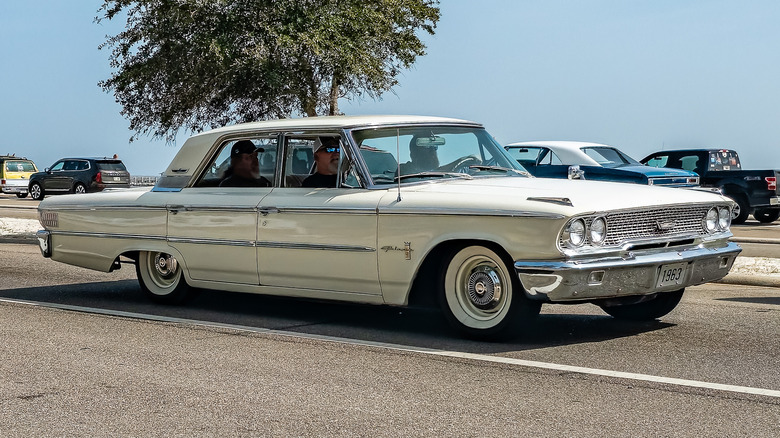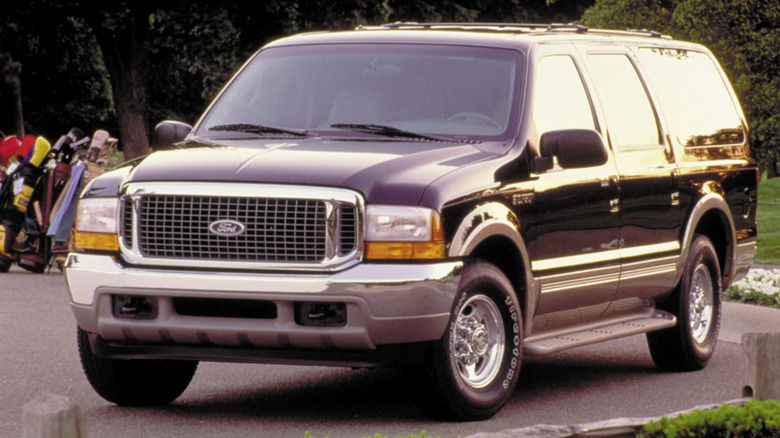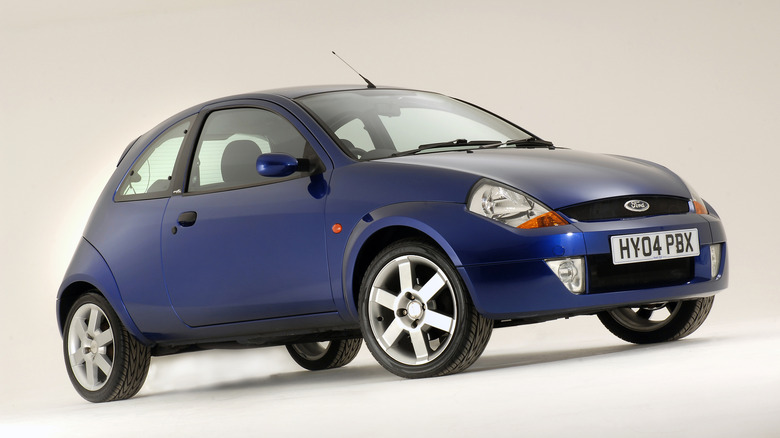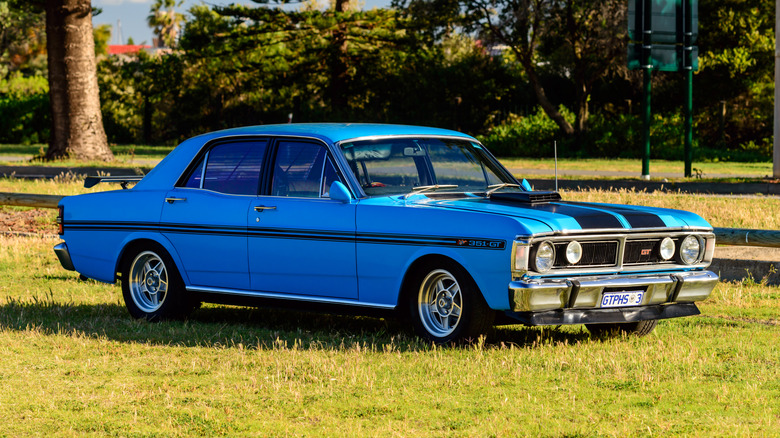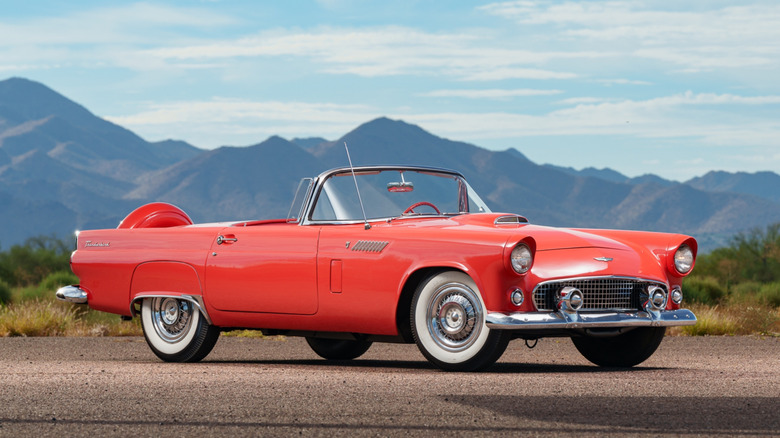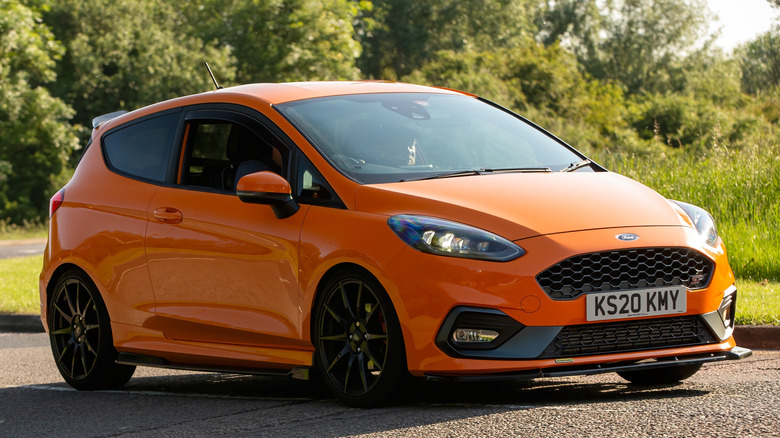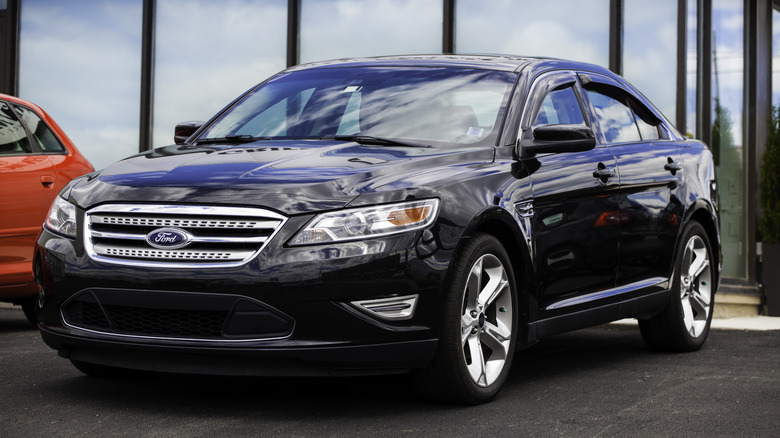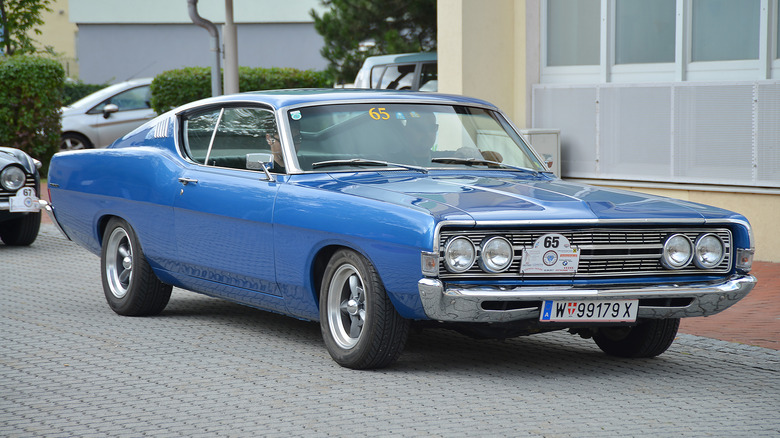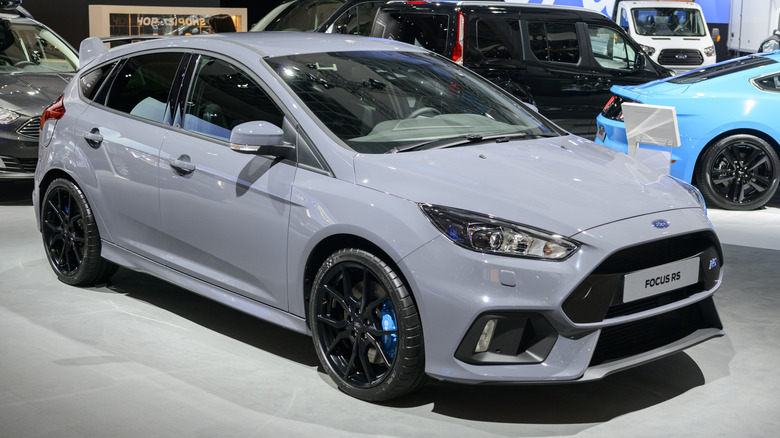10 Discontinued Ford Models That Deserve A Second Chance
There isn't a single major automaker that got to where it is today without continual innovation, and part of that innovation involves weeding out underperforming models in its lineup and replacing them. Ford is a prime example, with the brand's back catalog containing a long list of discontinued nameplates that stretch back to its earliest days. Some of these nameplates are still revered by enthusiasts despite being out of production for decades, while others have been largely lost to time.
Ford's recent decision to resurrect its Capri nameplate as a crossover is a controversial one, but it proves that the company isn't afraid to dig into its heritage to generate some extra buzz around its latest cars. If it stuck to the strategy, it would have plenty of classic names to choose from, and there are also several more recently discontinued models that arguably deserve to be brought back for a second shot at success. There are too many candidates to make a definitive list of every deserving nameplate, so SlashGear rounded the editors' favorites from the North American market and beyond.
Ford Galaxie
The sedan market has lost its shine in recent years, trailing in popularity behind SUVs and crossovers. However, buyer tastes are constantly changing, and if the body style does see a return to popularity in the near future, Ford might be caught off guard. The brand doesn't currently produce a sedan for North America, but if it did decide to develop one, choosing a classic name like the Galaxie might be a good place to start.
The Galaxie name has plenty of heritage, being originally launched in the '50s and surviving through 1974. It was both commercially successful and boasted a racing pedigree, most famously in America but also in overseas competitions like the British Saloon Car Championship. It was conceived as a rival to the Chevrolet Impala, a nameplate that proved much longer lasting than the Galaxie, having only been axed in 2020.
With shrinking domestic and foreign competition in the segment, a new Galaxie would be operating in a niche of its own as one of very few surviving American-made sedans. However, with Ford firmly committed to its SUV plan, a resurrection seems unlikely to happen for the foreseeable future.
Ford Excursion
The Ford Excursion was not a hit when it was new, with concerns raised about its excessive size and poor gas mileage. The SUV was discontinued in 2005, but almost two decades later, the time is arguably right for it to be given a second chance. Huge SUVs are no longer the outlier they once were, in fact they're now an increasingly common sight on the roads and offered by a wide range of manufacturers.
The model's poor gas mileage might still put off some buyers, but modern powertrains are in general significantly more efficient than those of two decades ago. The introduction of a hybrid powertrain would improve those numbers further still. The present day Expedition covers a similar area of the market, but the Chevy Suburban and Tahoe prove that there's room in a manufacturer's lineup for more than one full-size SUV. Excursions continue to trade on the resale market for surprisingly high prices, and so Ford is arguably missing a trick by not capitalizing on the goodwill for its nameplate while it remains in demand with buyers.
Ford Ka
On the opposite end of the size spectrum to the Excursion sits the Ford Ka, a small but popular car that was never sold in America. It was introduced in Europe in 1996 as an entry point into the Ford range, slotting below the Fiesta. Its styling was unlike anything else in Ford's lineup at the time, and its low asking price and zippy handling made it a popular choice for buyers on a budget. Its 1.3L four-cylinder engine meant that it was a long way from fast, and future generations of the car never improved much in terms of performance.
Arguably, those later generations never managed to match the styling of the first generation either. Ford eventually discontinued the Ka, which was later marketed as the Ka+, in 2019. As a budget model, the Ka was never particularly lucrative for Ford, and with the brand's pivot towards larger SUVs and crossovers, it was always destined for the chopping block. The cheapest Ford available in the U.K. as of this writing is the Puma crossover, which starts from £25,650 (around $33,700). That leaves a gap below the current lineup for an entry-level model such as a new Ka, but it seems unlikely that one will be unveiled anytime soon.
Ford Falcon
While the Falcon nameplate has a fanbase in North America, it's most legendary in Australia. Long after the American market Falcon was discontinued, Ford's Aussie division continued to design and manufacture new versions of the car, right up until the last one rolled off the production line in 2016. It marked the end of an era for Australian car-making, which has since disappeared altogether after the 2017 withdrawal of GM's Holden from domestic manufacturing.
Aussie-made Fords simply weren't selling in high enough numbers to justify the factory's continued operation, and after shutting down its plants for good, it seems unlikely that the brand will make a return in the future. If it did, the Falcon seems a natural candidate to lead an Australian car-making revival given the local reverence for the name.
What form a modern Falcon could take is another matter — the traditional formula of a rear-drive sedan with a powerful engine proved to be financially unviable, and it's unlikely that will change in the future. So, a revived Falcon would necessarily be subject to some drastic changes, but if that was the case, whether it would be accepted by fans of the nameplate is another potential sticking point.
Ford Crown Victoria
By the time the Crown Victoria was discontinued in 2011, it was archaic compared to the rest of the brand's lineup. Its platform could trace its roots back to the '70s, and its handling and gas mileage reflected that. Still, its tried and tested nature meant that it remained a popular police vehicle right up until its discontinuation. Developing a new platform for the car would have potentially been an expensive task, and given Ford's tight finances at the time, it simply wasn't an option.
Instead, the brand chose to focus primarily on its SUV offerings, where it was seeing healthy growth and even healthier margins. The Crown Vic was dropped and would-be buyers were instead directed to the Taurus, which itself would be eventually discontinued. A revived Crown Vic would likely have to focus on the same markets that the original did, being primarily aimed towards law enforcement and commercial uses like taxis. The market is missing a simple, tough, American-made sedan, but that's simply because, for now at least, such a car would probably not sell in large enough numbers to justify its development.
Ford Thunderbird
After four decades or so of production, the Thunderbird was originally discontinued in 1997. It reemerged at the turn of the century with a retro-modern look that some loved and some hated, and which arguably hasn't aged too well. Sales slipped soon after its launch and it was discontinued again in 2005. Earlier Thunderbird generations have remained popular collectors' cars in the decades since they left the factory, and the most recent generation has its fair share of fans too.
Reviving the Thunderbird name once again isn't entirely out of the question — Ford's website currently describes the nameplate as "on hiatus" — but what a new Thunderbird would look like is another matter. The original was a small, lightweight, affordable sports car, but the most recent iteration was a large novelty cruiser based on the chassis of a Jaguar sedan. That evolution gives Ford some wiggle room to reinvent the car once again, perhaps as a sporty model with an electric or hybrid powertrain. Coincidentally, the Thunderbird name would fit well thematically with Ford's current electric pickup, the F-150 Lightning.
Ford Fiesta
The Euro-spec Ford Fiesta has been a staple in the U.K. since its introduction in 1976 and remained the most common car on British roads in 2023 despite being axed that year. It was also the most popular car sold on the U.K.'s used market in the first quarter of 2024. Given its continued popularity, Ford's decision to ax the model seems like a strange choice.
Instead of investing in a new Fiesta platform, Ford has instead decided to prioritize SUVs and crossovers, which boast fatter margins and usually come with significantly higher price tags. It has also invested heavily in the rollout of EVs, although in August 2024, it announced that it was scaling back its plans in response to weak demand.
Ford's abandonment of the affordable car market is a risky strategy — while higher-spec models deliver shareholder pleasing profit margins, they also price out first time buyers and those on tighter budgets. The rapid rise of economy-focused brands like Dacia and MG in the UK proves that there's still plenty of demand for affordable cars, but it seems unlikely that the Fiesta will return to production for the foreseeable future despite this demand.
Ford Taurus
Ford's decision to discontinue the Taurus in the face of slowing sales was not a surprising one. The last example of the North American Taurus left the production line in 2019, although it still survives in the Middle East and reportedly remains a strong seller. The Taurus was the victim of the American market's shift to SUVs and crossovers, with interest in the model steadily declining throughout the 2010s. The nameplate had already been briefly axed a few years prior, but was resurrected in sixth-generation form for the 2010 model year.
It's been recently reported that Ford is working on a new EV platform similar to GM's Ultium, which would give it flexibility to develop a wide range of body styles from trucks to sports cars. Sharing a platform would drastically reduce the development time and cost for each new model, and could make lower volume models like the Taurus a financially viable option once again. However, Ford has yet to officially unveil the platform, and there's no timeframe as to when such a reveal might happen for now.
Ford Torino
SlashGear has previously argued that the Torino is a cooler car than many people give it credit for, and as such, it's worthy of a revival. Multiple notable muscle classics were produced throughout the Torino's time on sale, including the rare Torino Talladega. Then, there was its famous appearance in "Starsky & Hutch," which spawned its own limited-run commemorative version of the car. The nameplate was axed in the mid-'70s amid a lineup shakeup, and hasn't returned since.
Ford's lineup would arguably be benefitted by another sportier model, with the only non-SUV performance model it currently offers being the venerable Mustang. A revived Torino would offer some much-needed variety, although whether it would sell in large enough numbers to justify its development costs is another question. Much like the Taurus, the most likely way for the nameplate to make a comeback is as an all-electric model on Ford's mooted future EV platform.
Ford Focus
A little over a decade ago, the Focus was crowned the world's best selling car model, but from 2025, it's being discontinued. A compact and affordable car in base form, the Focus has been in production since the late '90s when it replaced the aging Escort as an all-new model. In more recent years, hotter versions have also been added to the lineup, culminating with the tire-smoking Ford Focus RS. The Focus' sales figures had been on the decline for years before its discontinuation was announced, with SUV and crossover sales eating into its market share alongside fresh competition from upstart brands.
The decision was made to ax the Focus after the current generation's lifespan was over, with the factory that currently produces the car likely to be shuttered after the last one rolls off the line. There has been no indication so far that the Focus will return in the future as an electric vehicle or otherwise, even though demand for small, affordable cars is unlikely to wane anytime soon.
